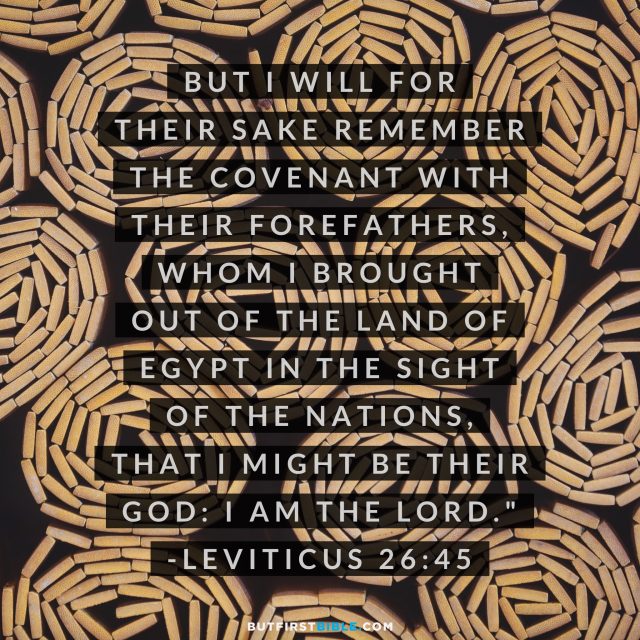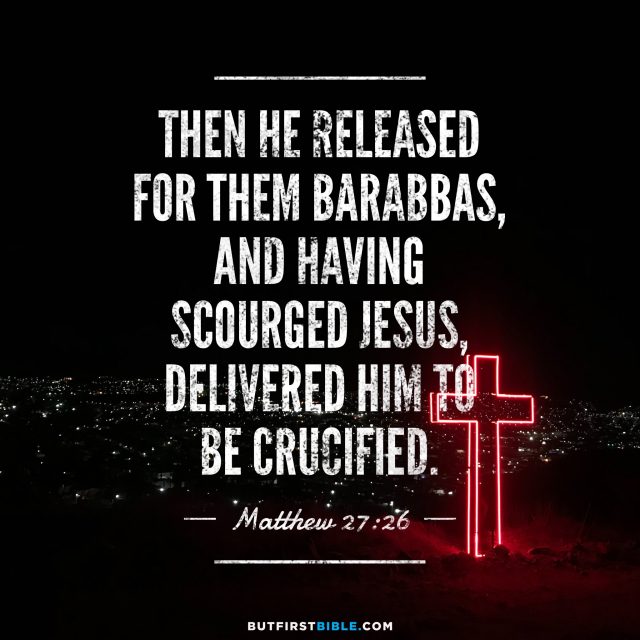
DAVEMIERS.COM

Welcome to the “But first, Bible” daily devotional podcast with Dave Miers.
Today we finish Leviticus with chapters 26-27 and continue in Mark’s gospel with chapter 2.
Leviticus 26 begins with these words,
Leviticus 26:1–2
[1] “You shall not make idols for yourselves or erect an image or pillar, and you shall not set up a figured stone in your land to bow down to it, for I am the LORD your God. [2] You shall keep my Sabbaths and reverence my sanctuary: I am the LORD. (ESV)
As the book concludes, we are reminded again that the LORD is the God of Israel and they are to have no other gods but him.
Leviticus 26:3 then begins, “If you walk in my statutes and observe my commandments and do them, then I will…” What follows is a list of blessings for Israel if they walk in obedience to the LORD who saved them.
Leviticus 26:14 then begins, “But if you will not listen to me and will not do all these commandments… then I will…” What follows is a list of punishments if they break the covenant with the LORD and walk in disobedience.
If this, then this.
The blessings are great. The punishments are to be feared.
If you know anything about the history of Israel after the book of Leviticus, you know that they will fail to walk in obedience and that Leviticus foreshadows many of the consequences for their disobedience.
Is that it for Israel? Will the LORD finally forget them and reject them?
Their disobedience doesn’t have to be the end.
Continue reading “Feb 18 – Leviticus 26-27; Mark 2 – I AM THE LORD”

Welcome to the “But first, Bible” daily devotional podcast with Dave Miers.
Happy Sunday!
Our bible readings for today are Leviticus 24-25 and Mark 1:23-45.
A reminder we have only just begun Mark’s Gospel – this would be a great time to encourage others to start our Bible reading plan.
Now, I have a Sunday challenge for you: in your conversations with other at your church gathering today – share one thing that has stood out to you from the Bible this week.
Here’s a verse to encourage you today to see the significance of church,
Titus 2:14
[14] [Jesus Christ] gave himself for us to redeem us from all lawlessness and to purify for himself a people for his own possession who are zealous for good works. (ESV)
Jesus died to make church happen! Much needs to be made of his act of redemption every time we get together as a Christians.
Continue reading “Feb 17 – Leviticus 24-25; Mark 1:23-45 – WEEKEND EDITION”

Welcome to the “But first, Bible” daily devotional podcast with Dave Miers.
Our readings today as part of our streamlined weekend edition of the podcast are: Leviticus 22-23 and Mark 1:1-22.
For the last 46 days we have been slowing working our way through Matthew’s Gospel… and so today we have moved onto our second New Testament book for the year: The Gospel According to Mark.
Do you have Christian friends you’d like to encourage to read the bible regularly? Today would be a good day to share this podcast and reading plan and encourage them to jump in.
Do you have unbelieving friends you’d like to encourage to read the bible? Mark’s Gospel is a fantastic place to start. You might like to share the podcast with them, or perhaps you could arrange to meet up and read Mark with them.
I’ve got another resource that might help as well: Jesus’ Epic Story. You can find it online at epicstory.net – There are 16 shorts videos produced by The Bible Society where I walk through Mark’s Gospel with some simple insights along the way. These videos have been used by people who have been following Jesus for a long time through to those who are new to Christianity and only just considering his claims. Go to epicstory.net for more info and let me know if you use them! I’d love to pray for any of your friends who may use them too.
Continue reading “Feb 16 – Leviticus 22-23; Mark 1:1-22 – WEEKEND EDITION”

Welcome to the “But first, Bible” daily devotional podcast with Dave Miers.
Our readings for today are Leviticus 20-21 and Matthew 28:1-20.
Good news. Jesus’ tomb is empty! He died on the cross, but on the third day, he rose from the dead. This was surprising news for the disciples in Matthew 28. However, it shouldn’t have been a surprise as Jesus said specifically back in chapter 16, chapter 17, chapter 19 that he would suffer, die, and then be raised again.
The empty tomb of Jesus is the guarantee that all those who trust in him will also have empty tombs. Jesus died on the cross, in our place, and for our sin. Jesus rose from the dead and offers resurrected eternal life to all who trust in Him.
There’s been a bunch of mountain top experiences throughout Matthew’s Gospel, and now the final scene of this book has Jesus – once again – on a mountain top with his disciples. What is the final message that Jesus gives his disciples before he ascends back up to heaven?
Let me read from Matthew 28:18-20,
[18] And Jesus came and said to them, “All authority in heaven and on earth has been given to me. [19] Go therefore and make disciples of all nations, baptizing them in the name of the Father and of the Son and of the Holy Spirit, [20] teaching them to observe all that I have commanded you. And behold, I am with you always, to the end of the age.” (ESV)
This is often called by commentators: The Great Commission. Three things to notice:
Continue reading “Feb 15 – Leviticus 20-21; Matthew 28:1-20 – THE GREAT COMMISSION”

Welcome to the “But first, Bible” daily devotional podcast with Dave Miers.
Our readings for today are Leviticus 18-19 and Matthew 27:32-66.
Today we will reflect upon the moment that the whole of Matthew’s gospel has been leading up to: the death of Jesus on the cross.
We will focus on a few verses from Matthew 27, but we will also refer back to yesterday’s Leviticus 16 reading to show how the Day of Atonement is a shadow of the events that are to come in Jesus’ death on the cross.
Let me begin by reading from Matthew 27:45–46,
[45] Now from the sixth hour there was darkness over all the land until the ninth hour. [46] And about the ninth hour Jesus cried out with a loud voice, saying, “Eli, Eli, lema sabachthani?” that is, “My God, my God, why have you forsaken me?” (ESV)
Darkness over the land at midday is not normal. Something supernatural was taking place. In the Bible light is a symbol of God’s blessing and darkness is a symbol of God’s judgement. The darkness that descends is a physical picture of the spiritual reality that is taking place at the cross. Jesus quotes Psalm 22 saying, “My God, my God, why have you forsaken me?”
God is acting in judgement and Jesus is being forsaken. What does that mean? This is an emphasis not just on the physical pain of crucifixion – verse 35 simply says ’they had crucified him’, but on the spiritual pain of THIS crucifixion. We’ve already seen back in Matthew 26 when Jesus prayed in Gethsemane that his soul was sorrowful even to death at the contemplation of drinking the cup of God’s wrath at the cross.
Continue reading “Feb 14 – Leviticus 18-19; Matthew 27:32-66 – THE DEATH OF JESUS”

Welcome to the “But first, Bible” daily devotional podcast with Dave Miers.
Our readings today are from Leviticus 15-17 and Matthew 27:1-31. If you haven’t had a chance to read the Bible yet, maybe pause this podcast to go hear from God’s word, and then come back for my brief reflection on Matthew 27.
Okay, welcome back.
Over today and tomorrow, we are reading about the death of Jesus on the cross in Matthew’s gospel.
I want to focus on theology and history. History describes what took place. Theology describes why – from God’s perspective – it took place.
Our keyword for this study is SUBSTITUTION.
First, we will look at substitution from a theological perspective.
The following is a quote from John Stott’s magnum opus – The Cross of Christ – in his chapter on ’The Self-Substitution of God’.
“The concept of substitution may be said to lie at the heart of both sin and salvation. For the essence of sin is man substituting himself for God, while the essence of salvation is God substituting himself for man. Man asserts himself against God and puts himself where only God deserves to be; God sacrifices himself for man and puts himself where only man deserves to be. Man claims prerogatives that belong to God alone; God accepts penalties that belong to man alone.” (John Stott, The Cross Of Christ)
Second, we will look at substitution from a historical perspective.
Continue reading “Feb 13 – Leviticus 15-17; Matthew 27:1-31 – BARABBAS & SUBSTITUTION”